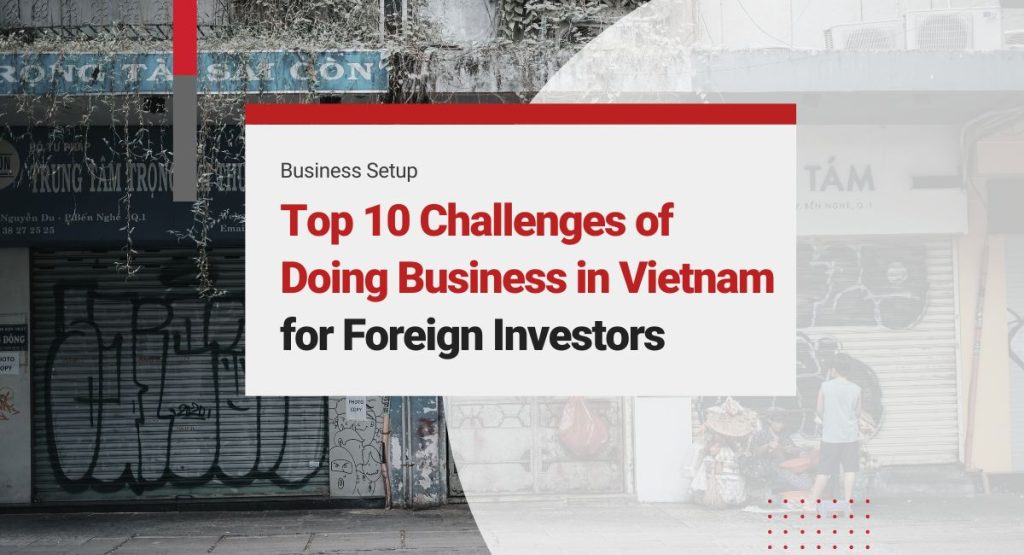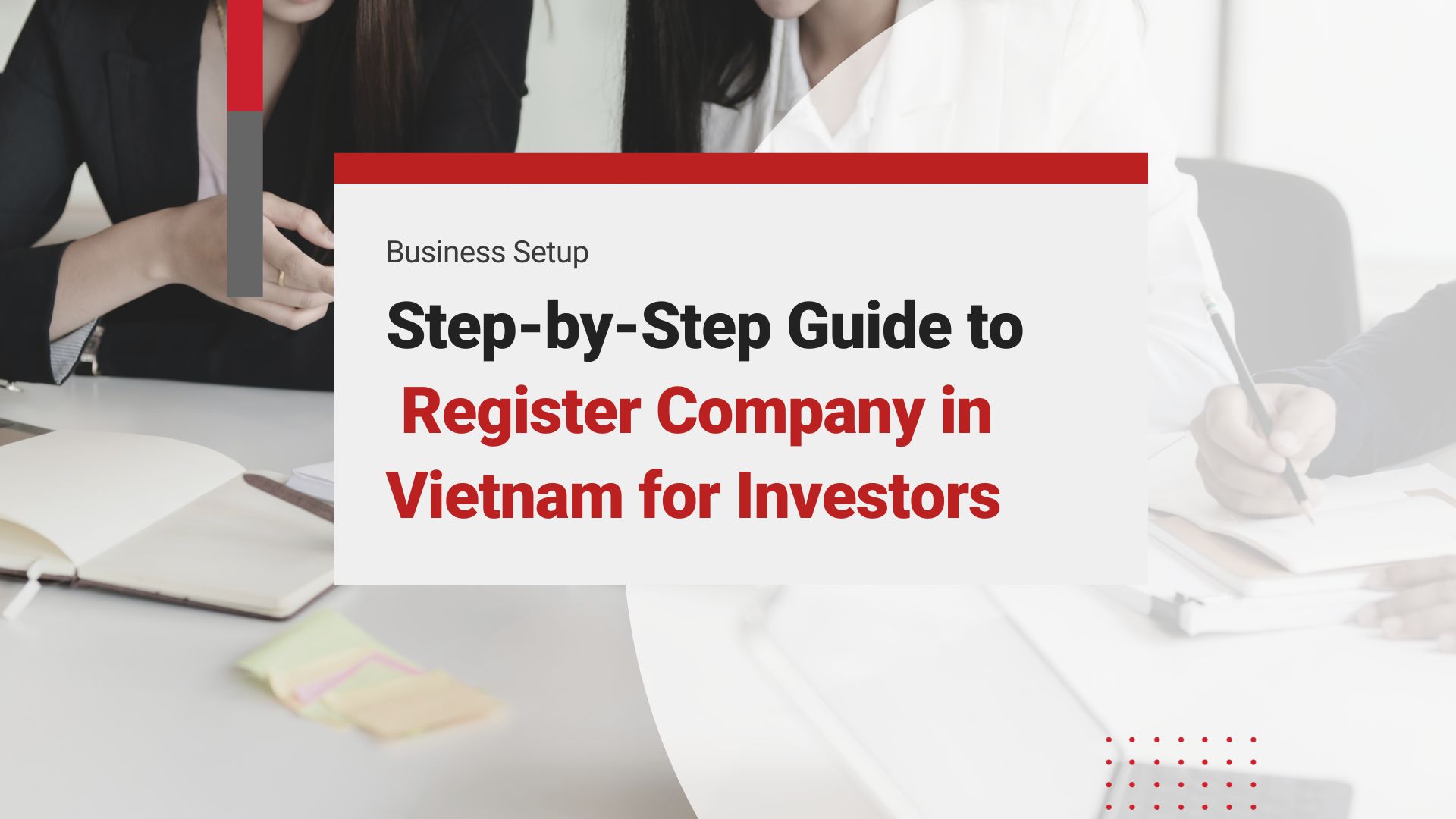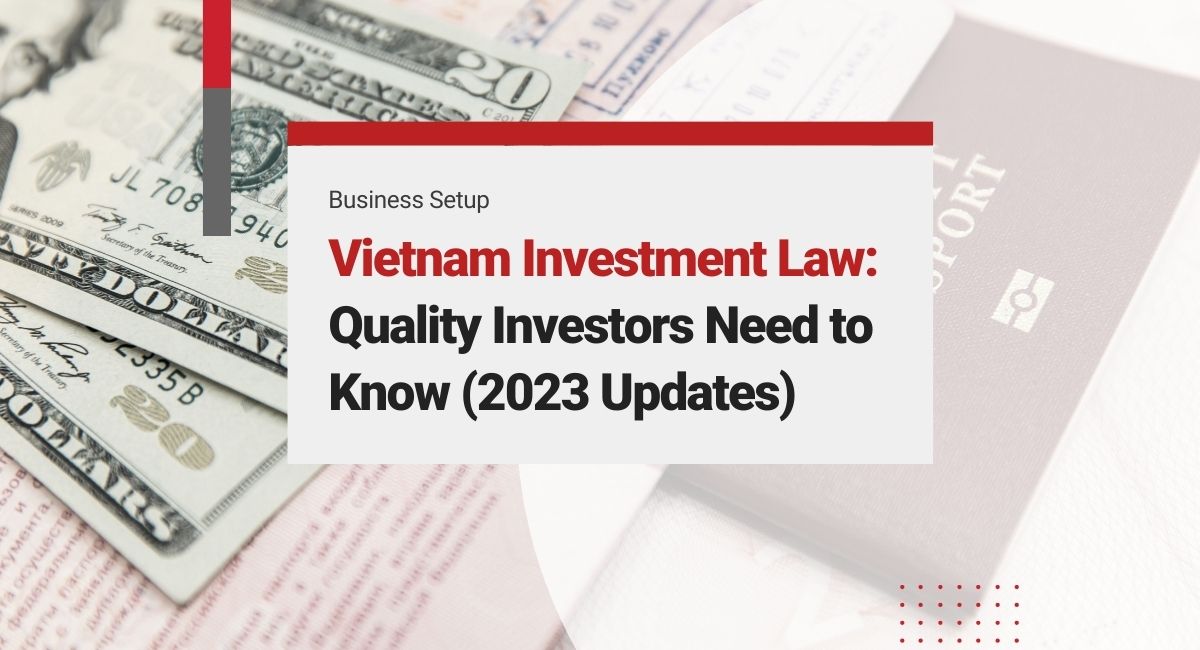Vietnam, an Asian high-growth market, offers promising business opportunities as well as challenges for Chinese businesses, as compared to China itself. Emerging as a highly attractive investment destination, it continues to capture the attention of companies seeking international expansion. Stability in the country’s politics, favorable economic policies, and supportive administrative interventions contribute to its allure for investors. Additionally, Vietnam boasts a young and sizable population, with more than half of its citizens under the age of 35. This youthful demographic holds immense potential for businesses, driven by their unique consumption patterns and activities.
Invest in Vietnam? Check out InCorp Vietnam’s Company Incorporation Services in Vietnam
Being a member of various regional forums and trade agreements, such as ASEAN, the EU-Vietnam Free Trade Agreement, and the Trans-Pacific Partnership, Vietnam has become an attractive investment destination. With an expected annual growth rate of over 6%, Vietnam’s economy is driven by a thriving domestic market and a growing, educated middle class.The country’s economic reforms and transition to a market economy have made it a dynamic emerging nation in East Asia. With a remarkable growth in GDP per capita and a significant economic recovery in 2022, Vietnam’s economic indicators are strong and promising.
In 2022, Vietnam’s GDP experienced a remarkable growth of 8.02%, the fastest since 1997. Foreign direct investment (FDI) into the country also saw significant growth, rising by 13.5% to reach US$22.4 billion. Key sectors such as manufacturing, real estate, electricity production and distribution, and scientific and technological activities attracted the most foreign investment.
However, foreign investors may encounter challenges while investing in the country. Before making a final decision, it is essential for foreign businesses to conduct thorough research and spend time understanding the market dynamics in the country.
Read More: Challenges of Doing Business in Vietnam: What, Where, Why, How
Trouble due to Excessive Bureaucratic Procedures
Starting a business in Vietnam can be challenging due to excessive bureaucracy, with varying complexities based on the type of business. Certain sectors may have especially tough licensing requirements, further complicating the process.
Setting up a business in Vietnam typically takes about 1.5 months for companies in standard sectors like trading or IT. However, businesses in conditional sectors such as tourism or retail sales may experience up to a 4-month process. As Vietnam moves towards globalization, the regulatory environment is changing, resulting in bureaucratic challenges and limited transparency in some areas.
Inconsistent government policies result from regulatory systems, overlapping ministries, and hinder due diligence and know-your-customer (KYC) processes due to poor corporate disclosure standards and limited financial transparency.
Here are a few additional challenges that a foreign investor may have to encounter while attempting to invest in Vietnam:
- Getting construction permits in Vietnam is a time-consuming and complex process involving various official departments. It spans 11 steps and takes 110 days. Businesses must undergo inspections by the Department of Construction and the municipality, as well as obtain certificates from authorities like the Firefighters Prevention Department, the Department of Construction, and the Department of Natural Resources and Environment.
- Getting an electrical connection is a significant challenge for startups in Vietnam, taking 115 days and incurring substantial costs relative to per capita income. Startups have to undergo inspections by the local power corporation and complete procedures with the Traffic and Transport Department and the Firefighters Prevention Department to obtain the connection.
- Property registration in Vietnam usually takes 57 days, which exceeds the OECD norm but is within the average for the East Asia and Pacific region. The process begins with the contract signing between the transferor and transferee, followed by tax payments, and finalizing the registration for land use rights.
- Enforcing contracts in Vietnam is a complex and time-consuming procedure, taking around 400 days and involving 34 steps. This lengthy and intricate process can be challenging for businesses aiming to settle disputes through legal means. Additionally, resolving insolvency in Vietnam is a protracted undertaking, averaging five years, one of the lengthiest in the region. Moreover, creditors in insolvency cases have a relatively low recovery rate, further complicating matters for financially distressed businesses.
Required Use of The Vietnamese Language in Paperwork
All documentation and paperwork related to business operations in Vietnam must be in the Vietnamese language. For foreign documents, certified Vietnamese translations are necessary. The courts, in the home country, must notarize or certify these translations. Subsequently the Vietnamese embassy must authenticate them.
It is important to note that licenses issued by Vietnamese authorities are also in the Vietnamese language. While certain licensing and reporting procedures can now be conducted online, the language and authentication requirements remain unchanged.
Vietnamese Currency (VND) in International Transactions
The crawling peg system intricately connects the Vietnamese dong with the US dollar. This ensures exchange rate stability with trading partners. A stable exchange rate has proven beneficial for foreign direct investment in Vietnam. However, it’s important to be aware that the government tightly regulates transactions involving foreign currencies, with more relaxed rules on inflow compared to outflow.
Tax System in Vietnam
The government’s Ministry of Finance has implemented regulations to support businesses and to reform the tax system in Vietnam, in recent years. This includes the use of electronic invoices and streamlined procedures for VAT and corporate income tax (CIT) filings. The introduction of electronic tax declaration in late 2017 has further improved tax reporting efficiency. Amendments to CIT, VAT and tax administration laws seek to clarify ambiguous tax matters and alleviate the tax compliance burden for companies operating in Vietnam.
Despite these improvements, paying taxes remains a cumbersome process in Vietnam. Businesses have to make a substantial 32 corporate tax payments each year, taking an average of 872 hours to complete. There are additional tax burdens such as VAT and social insurance, which need to be fulfilled annually.
Cash-dependent Economy of Vietnam
Vietnam’s economy relies heavily on cash transactions, making it one of the most cash-dependent economies globally. There are over 90% of domestic transactions conducted in cash, in the country. The rampant usage of cash transactions is primarily due to the scarcity of ATMs and reliable cashless systems. There is also a lack of confidence in local banks plagued by corruption issues. To address this challenge, many Vietnamese businesses resort to using wire transfers for fund transfers.
To foster a more efficient and modern economy, the Vietnamese government has set its sights on transforming the country into a “cashless economy.” This ambitious plan involves implementing necessary infrastructure to support cashless transactions by incentivizing electronic payments. This will further entail reducing associated fees and concurrently increasing fees on cash payments.
Loopholes in Intellectual Property
The protection of intellectual property (IP) is limited by territorial rights, providing protection only within the countries where it is registered. Therefore, it is crucial for businesses to register their IP rights in all relevant export markets, including Vietnam.
Vietnam ranks 77th out of 140 countries, for IP protection, in the World Economic Forum’s Global Competitiveness Report 2018. This underscores the importance of proactive measures to safeguard IP before venturing into the Vietnamese market. Although Vietnam has established regulations to protect intellectual property rights (IPR), the enforcement remains weak.
Early implementation of defensive measures is essential when planning to enter the Vietnamese market, given the challenges with IP enforcement in the country. Vietnam’s reputation as the 11th-ranked country, out of the top 20, for pirated software usage further highlights the existing IP abuse issues.
The Vietnamese government is taking steps to address IP challenges, by introducing new legislation to enhance protection in various areas. This is inclusive of copyright, industrial property and plant varieties. Foreign companies seeking to register their intellectual ownership should apply through authorized agents at the National Office of Industrial Property of Vietnam (NoIP). Regardless of the NoIP’s authority, it is advisable for foreign businesses to ensure robust IP protection before engaging in exports or establishing a presence in Vietnam.
The Reality of Corruption in Vietnam
In the Corruption Perceptions Index by Transparency International, Vietnam is ranked 117th out of 180 countries, reflecting the ongoing challenge of corruption. Despite the government’s efforts to combat corruption, it remains a widespread problem in Vietnam. The country has introduced anti-corruption laws, strategies, and institutions, including enacting the Law on Access to Information. However, implementation and enforcement measures have been slow, resulting in only modest improvements.
Activities like taking bribes, making facilitation payments and exchanging valuable gifts are illegal. This is why many foreign companies advocate a zero-tolerance policy from the outset to maintain ethical business practices. The judicial system also grapples with corruption, as there is limited judicial independence in the country.
Irrespectivelt, to address private sector corruption and promote business integrity, collaborative efforts are underway. In this regard, under the FCO’s Prosperity Fund, the British Embassy, the Vietnam Chamber of Commerce and Industry (VCCI) and the IBLF Global are working together to develop the Government-Business Integrity Initiative.
Business Culture Differences Need to Note
Operating a business in Vietnam comes with distinct challenges, particularly concerning business culture and communication. The language barrier is a common obstacle, as all official documents and paperwork must be in Vietnamese. This often leads foreign companies to maintain both English and Vietnamese versions of legal documents simultaneously.
Understanding the local business culture is essential when building teams in Vietnam. One crucial aspect is the “Saving Face” mindset prevalent among the majority of Vietnamese. Individuals express agreement to avoid embarrassment, even if they don’t fully understand or agree with the tasks. Adept in Vietnamese language and culture is crucial in HR for effective communication and relationship building.
Vietnamese business culture places significant emphasis on social connections with business partners, likely influenced by Confucianism’s impact on the local society. Sharing personal information about family and hobbies is customary. This strengthens relationships with local suppliers, potentially influencing business deals. Referrals and recommendations play a pivotal role in forming connections. Additionally, respect for seniority is crucial, especially when dealing with government or state-owned organizations.
Collective decision-making is a prominent feature of Vietnamese businesses. Most decisions are made by committees rather than individuals holding absolute power. This group-oriented approach highlights the importance of building connections within the group, rather than solely focusing on individual relationships.
Cyber Security in Vietnam’s Digital Frontier
Vietnam embarked on a new era of cyber security with the implementation of a comprehensive law on January 1st, 2019. This law introduces critical mandates related to data localization, business presence, and the storage and authentication of user information.
Under the law, businesses are obligated to furnish information to Vietnamese authorities upon request and promptly take action to prevent and remove specific content within a strict 24-hour timeframe. However, comprehensive guidelines for the law’s execution and enforcement have yet to be finalized.
Battling Natural Disasters
Vietnam’s location exposes it to tropical cyclones, commonly between May and November, though sometimes extending beyond these months. The devastating combination of heavy rainfall and strong winds during these cyclones can lead to flooding and travel disruptions.
To stay informed and prepared, it is crucial to keep a track of imminent storms on the website of the National Center for Hydro-Meteorological Forecasting. This would include heeding the guidance of local authorities, including any evacuation orders they may issue.
Vietnam’s monsoon climate leads to flooding, flash floods, and landslides due to heavy, sudden rainfall and cyclones. When venturing through rural or mountainous areas, exercise extra caution to avoid potential risks.
Conclusion
Despite these challenges, Vietnam’s rapid economic growth, favorable investment policies and an educated population make it an attractive destination for foreign businesses. By taking proactive measures, seeking legal advice and understanding the local landscape, investors can capitalize on the country’s potential while effectively addressing the challenges to ensure successful ventures in Vietnam.
InCorp Vietnam: Paving Your Road to Success
InCorp Vietnam provides a full range of services to help businesses navigate Vietnam’s growing economic market challenges. We empower clients with regulatory expertise, local presence, and effective communication to navigate legal complexities, overcome language barriers, and innovate in the Vietnamese market. InCorp Vietnam’s commitment to facilitating successful business expansion in Vietnam makes us the go-to consulting firm for any company seeking to unlock the vast potential of this high-growth market.
1. Expert Regulatory Guidance
With 14 years in Southeast Asia and 5 in Vietnam, InCorp Vietnam possesses unmatched knowledge of the local legal scene. Our seasoned consultants understand Vietnamese regulations thoroughly, providing precise guidance on licensing, permits, and compliance, reducing risks and delays.
2. Local Presence and Accessibility
InCorp Vietnam’s friendly team on the ground in Vietnam offers an invaluable advantage to businesses entering the market. Having a local presence allows us to be readily available for face-to-face meetings, fostering a deeper understanding of our clients’ needs and providing prompt solutions to any arising challenges.
3. Effective Communication Skills
The language barrier becomes a non-issue when partnering with InCorp Vietnam. Our consultants possess excellent communication skills and fluent english, bridging the gap between foreign companies and Vietnamese authorities. By articulating clients’ visions clearly and professionally, InCorp Vietnam ensures that regulatory processes move forward seamlessly.
About Us
InCorp Vietnam is a leading provider of global market entry services. We are part of InCorp group, a regional leader in corporate solutions, that encompasses 8 countries in Asia-Pacific, headquartered in Singapore. With over 1,100 legal experts serving over 15,000 Corporate Clients across the region, our expertise speaks for itself. We provide transparent legal consulting, setup, and advice based on local requirements to make your business perfectly fit into the market with healthy growth.
Don’t take our word for it. Read some .
Verified by
Ian Comandao
Business Consulting Manager at InCorp Vietnam
Ian is a sales and marketing professional who has worked over 15 years in key accounts management.






